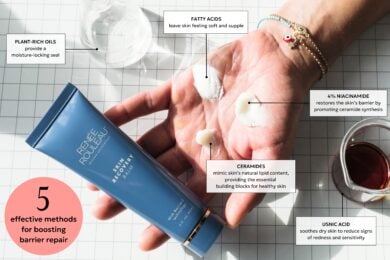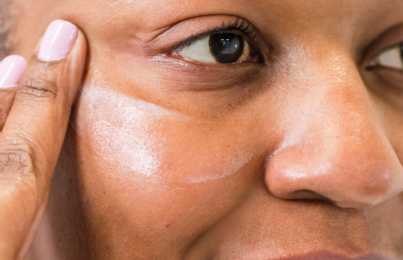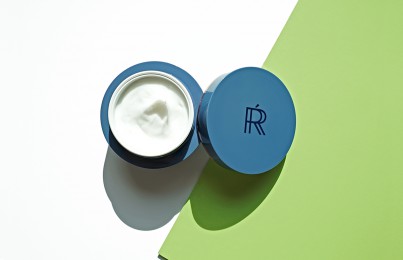Updated 12/18/24. If your skin is feeling dry, tight, and irritated, there is an underlying problem—your moisture barrier is damaged. When people learn this, their first instinct is to layer on a heavy moisturizer, but that won’t fix it. Chances are that you’re doing something day in and day out that’s causing it to stay damaged. The moment you identify (and remove) the culprit, your moisture barrier will naturally repair itself.
Keep reading to learn everything you need to know about your moisture barrier, including what it is, how it works, and what might be damaging it. Plus, learn my expert solutions. You’ll be back to having soft, healthy-looking skin in no time.
What Is a Moisture Barrier?
The moisture barrier is the outermost layer of the skin that helps retain water and provides protection from external aggressors, like bacteria and environmental debris. Think of it like your skin’s personal bodyguard, which helps keep the good in and the bad out. It’s made up of lipids (oils) that bind your skin cells together. When it’s intact, it’s responsible for keeping the skin feeling soft and smooth. When the moisture barrier becomes damaged, small, invisible cracks appear. Through these cracks, moisture can easily escape and irritants can easily enter. The skin may start to feel tight, dry, and sensitive. Essentially, it’s like your skin lost its protective bodyguard. Ouch!
How Can I Tell If My Moisture Barrier Is Damaged?
As an esthetician with 35+ years of experience, I can say that almost every single skin concern can be traced back to a damaged moisture barrier. In fact, not a day goes by that I’m not pinpointing a damaged moisture barrier as the underlying cause of someone’s skin issues.
Common signs of a damaged moisture barrier include redness and rosacea, dryness and dehydration, flakiness and peeling, irritation, itchiness, roughness, a stinging or burning sensation when products are applied, and increased breakout activity. If you experience any or all of these things, no matter your age, you might have a compromised barrier. If that’s the case, keep reading to learn how to fix it.
What Causes a Moisture Barrier to Become Damaged?
There are many different things that can damage your moisture barrier. It could even be a combination of factors, which is why it’s important to be attentive to your skin, as well as your skincare routine and lifestyle habits, to pinpoint the culprit(s). Here are some common causes of damage:
- Over-exfoliation (this is the most common one I see)
- Using drying skincare products (such as alcohol-based toners and high-foaming cleansers)
- Using acidic skincare ingredients (like certain forms of vitamin C that can give a “vitamin acid burn“)
- Washing the face with hot water
- Professional procedures like peels and laser treatments
- Skipping the use of moisturizer
- Too much sun exposure
- Prescription retinoids
- Dry climates and air conditioning
- Using certain skin devices, such as a at-home dermarollers
- Medications that list dryness as a side effect
- Genetics (Some skin types are naturally susceptible to a weak moisture barrier)
- Aging (the moisture barrier becomes more vulnerable after age 45)
8 Ways to Fix a Damaged Moisture Barrier
You haven’t done permanent damage if you’ve been overdoing it with exfoliation for a short period of time. In that case, it’s easily fixable. However, some damage has occurred if you’ve been using harsh products and over-exfoliating for years. Especially if that has gone hand-in-hand with sun exposure. The good news is that it’s never too late to get the skin back to a better place. If you’re making positive changes, I can assure you that you’ll see an improvement. Read on for 10 ways to fix a damaged barrier!
1. Care for Your Skin the Way You Would a Baby’s Skin
If your skin is acting unusually sensitive, a good mindset to have is to care for your skin like you would a baby’s skin. This means keeping everything simple and gentle until it feels back to normal. Go back to basics and lay off potentially irritating active ingredients for some time.
2. Cut Back on Exfoliation
Now that exfoliating products are so popular, many people use them daily. This is hands down one of the biggest and most common contributors to a damaged moisture barrier. When you exfoliate too often, you’re stripping your skin’s protective barrier, which all but guarantees that moisture will escape. This can set off a cascade of inflammation, which not only leads to that uncomfortable dry, tight feeling but also contributes to skin aging.
When you’re trying to fix your moisture barrier, I recommend laying off all exfoliating products for two weeks. Slowly work them back in once your skin feels better. When you reintroduce them into your routine, don’t use them every day. Instead, use them four to five times a week depending on your skin type.
Read my beginner’s guide to exfoliants
Note: If you use a prescription retinoid, know that it works, in part, by breaking down your barrier. While I don’t suggest that anyone stop using one, mainly because it’s so great for getting the skin to look and act younger, I do have some recommendations for how to lessen negative side effects. Read my beginner’s guide to retinol and prescription retinoids.
3. Use a Gentle Cleanser
When fixing a damaged moisture barrier, you’ll want to switch from a foaming cleanser (even if it’s gentle and sulfate-free!) to a cleansing lotion. These cleansers are generally much milder, which is important for dry, tight, or irritated skin.
Read nine surprising cleansing mistakes you need to stop making.
4. Avoid Washing Your Face With Hot Water
Hot water dilates capillaries and raises the skin’s internal temperature. It can also impair the skin’s moisture barrier. That’s why it’s best to use lukewarm water to wash your face—especially in the winter months when the barrier is typically the most fragile.
5. Wear Sunscreen
Sunscreen is the ultimate product for defending your skin from one of the worst sources of environmental damage—the sun. The UVA and UVB rays that are given off by the sun will only contribute to a damaged moisture barrier. That’s why it’s so important to apply sunscreen generously and consistently, rain or shine.
Read this is how much sunscreen you should actually be wearing.
6. Choose a Moisturizer That Contains Specific Ingredients
Moisturizers can certainly aid in fixing a damaged moisture barrier, but it’s important to use those that contain ingredients that mimic the natural lipids found in the skin. And remember, just because a moisturizer feels heavy and greasy doesn’t necessarily mean it will be the best for fixing your moisture barrier. Read why here. It’s all about the ingredients.
Some effective ingredients for barrier repair are borage oil, evening primrose oil, shea butter, phospholipids, niacinamide, ceramides, shea butter and usnic acid.
For quick repair: use Rest Day Masque (it’s great to use as a sleeping masque and is a 2024 Allure Best of Beauty winner!)
For dry skin barrier maintenance: use Skin Recovery Balm (See the five barrier-repairing methods used and how they work)
For acne-prone barrier maintenance: use Skin Recovery Lotion (See this incredible before and after)
Note: You might be looking at some of the above ingredients and think they’d make a rich, greasy moisturizer. That is not the case. A moisturizer can include these ingredients without being heavy and pore-clogging. It all depends on the percentages that are used and the oil-to-water ratio in the formula. Read more about what makes ingredients pore-clogging in this post.
7. Use an Essence
All skin types need water, but when you’re trying to fix your moisture barrier, it’s even more important. After all, when your moisture barrier is damaged, it lets water escape your skin through a process called transepidermal water loss.
One of my favorite ways to deeply hydrate the skin is by using an essence. These products are similar to toners, but they’re serum-infused with water-binding ingredients. They often have a slippery gel-like texture rather than a watery one. My favorite one to use is the Moisture Infusion Toner. It includes phospholipids, moisturizing skin oils, and niacinamide to help strengthen and support the moisture barrier.
Here’s how I recommend using it. Start by washing your face with a cleansing lotion. Then, apply a generous amount of the Moisture Infusion Toner to a Toning Cloth and wipe it over your face. Next, pour a quarter-sized amount into the palm of one hand. Pat the product all over your face using the fingertips of your other hand. Repeat this two more times. Afterward, your skin should feel cool and plump. To finish, seal it in with a serum and moisturizer. I recommend performing this technique twice a day for one to two weeks (although you can certainly make it a year-round habit for hydrated skin).
No matter if you’re using a traditional toner or an essence, apply it within 60 seconds of cleansing. Doing so will prevent water loss. I call this the Golden Minute Rule, and it’s very effective for keeping the skin nice and hydrated.
8. Use Face Oil (the Right Way)
Whenever my clients are in need of a serious fix, I always recommend they use a well-formulated face oil. I suggest patting it over moisturizer as the last step in their nightly skincare routine. This will provide a protective seal over the skin so everything that’s underneath is less likely to evaporate.
How Long Does It Take to Fix a Damaged Moisture Barrier?
If you’re eliminating the things that are causing damage, and you’re investing in the right products to correct it, you should be able to fix your moisture barrier within two to four weeks. For some people, it could be quicker. The skin is truly incredible in that it’s always working to address whatever stressors come its way. That’s why you want to work with it, not against it.
There is really no reason anyone should suffer from dry, tight, or irritated skin. We have advanced so much in skincare. It’s truly an easy fix if you have the right products and at-home regimen.
I hope you found this post helpful. I also hope your skin will return to softer, calmer, and more hydrated state soon.
Next, Read five skincare mistakes everybody makes!
Celebrity Esthetician & Skincare Expert
As an esthetician trained in cosmetic chemistry, Renée Rouleau has spent 35 years researching skin, educating her audience, and building an award-winning line of products. Her hands-on experience as an esthetician and trusted skin care expert has created a real-world solution — products that are formulated for nine different types of skin so your face will get exactly what it needs to look and feel its best. Trusted by celebrities, editors, bloggers, and skincare obsessives around the globe, her vast real-world knowledge and constant research are why Marie Claire calls her “the most passionate skin practitioner we know.”




Comments:
Hi I have a question I think my skin barrier is damaged is there a way a doctor or dermatologist can tell like with a test or skin biopsy. Also my skin is itchy and irritated I think it’s from the barrier being damaged is it ok to use a cleanser with physical exfoliants right now I also have acne and I read online if your sensitive to stay away from manual exfoliants. I’m getting more into skin care since I’m 25 once I fix the barrier when will be ok for me to get procedures done like chemicals peels and microdermabrasion and other skin treatments.
Posted By: Morgan Mckinney |
Hello! If you feel like your barrier is damaged it probably is. It is always best to be cautious with exfoliation. I would suggest skipping any forms of exfoliation for at least one month to give your barrier time to rebuild. If your skin is routinely sensitive you may not be a great candidate for manual exfoliants, even if your barrier is intact. When you’re ready to jump back into professional treatments you may want to consult with your personal esthetician about what treatments will meet your skincare goals!
Posted By: Ella Stevenson |
Hi! I am Aiyshah and I am very confident that I have patches of damaged skin barrier on both my cheeks. Although I do follow all these steps, I am also worried as I have an acne-prone, combination skin in addition to a damaged skin barrier. I can actually see holes on my skin and I am suspecting that the holes are the reason why it is easy for dirt to enter my pores and clog it, explains the frequent 5-6 pimples that pop out way too often.
You said in the blog not to exfoliate and not to use harsh cleansers with exfoliating acids that can compromise the repairing of my skin barrier. However, these are the only products that keep my pimples in bay. Thus, I want to ask your advice on how to repair my skin barrier when it gets clogged too often by too hydrating products and dirt without using harsh products on my face.
Would be grateful if you answer my queries.
Thank you:)
Posted By: aiyshah |
Great question! Instead of working on exfoliating the blemishes away, try calming and soothing the skin. This will reduce the skin’s inflammatory response which will result in fewer breakouts. I recommend trying the Skin Correcting Serum! It’s designed to reduce the frequency of breakouts.
Posted By: Ella Stevenson |
Hello. I have a damaged moisture barrier I think (because my skin breaks out suddenly and my skin is irritated, itchy,dry). So I have been using this moisturizer (NMF + HA by The Ordinary) when I applied this product, my cheeks felt so itchy (only cheeks) and at other parts of my face, it feels good. So good. Does this mean I need to change my moisturizer. Thanks.
Posted By: Dania Shipka |
I don’t know how other companies are sourcing their formulas so I am not sure if this moisturizer is a good fit or not. If your barrier is damaged I would suggest using our Phytolipid Comfort Creme!
Posted By: Ella Stevenson |
Hi Renee,
In early Feb, my dermatologist told me I broke my skin barrier, apparent with the very dry skin over my entire face, redness and scaly. For over a decade (I am 51), I had been using 1% Retin A Micro every night, followed by a hyaluronic acid serum and Cerave PM moisturizer. In the a.m., I applied Skinceuticals C E Ferulic, Coenzyme Q10 serum, Cerave PM moisturizer and sunscreen. I had been using EltaMD SPF46 but 6 months ago started using Avene Anti-Age SPF50 that I purchased in Europe. Since my diagnosis, I have been washing my face at night with VaniCream Gentle Face Cleanser, only rinsing with lukewarm water in the a.m., spot applying Differin where necessary, and covering with Cerave Moisturing Cream. My skin looks much better, but is still a little dry around my eyes. When can I start re-introducing anti aging products? Do you have any recommendations on which products, when, and how often? Thank you!
Posted By: Patricia |
I would encourage you to think of moisturizing products as anti-aging products! Anything that hydrates and calms the skin keeps the skin youthful. I would suggest trying the Total Eye Repair Creme to nourish the delicate skin around your eyes.
Posted By: Ella Stevenson |
Hello, I suffer from acne, damaged skin barrier, comedones, acne scars, uneven skintone and basically everything in one. Can I please send you photos of how my skin looks and help me?
Posted By: Linda |
Hi there, I’m so sorry to hear that you’re experiencing a damaged barrier at the moment. I recommend looking into booking a Virtual Consultation with one of our licensed estheticians! You can learn more & book here: https://www.reneerouleau.com/pages/spas-virtual-consultations
Posted By: Ella Stevenson |
Hi Renee,
I found out about you through the “Breaking Beauty” podcast. I wanted to ask you what you feel are going to be the top 3 products to help heal the moisture barrier. I was on accutane several years ago and had good results. However, it has really done damage on my barrier and now I am dealing with worse breakouts than before I was on accutane. I’m not at the point were I can afford all the products you suggest, but I am willing to invest in a few to start my healing process. Thank you!
Posted By: Mallory |
Great question! Some excellent barrier repairing products are Moisture Infusion Toner, Moisture Protecting Cleanser, and Phytolipid Comfort Creme!
Posted By: Ella Stevenson |
I think my Skins barrier is messed up from acids. I took your skin quiz and it’s says type 3. I am oil cleansing and it is clearing up my skin. I am puzzled because you say my skim routine should be oil free and bha. So what you think now that my skin barrier is messed up
Posted By: Whit |
I’m sorry to hear that your barrier is damaged! I would suggest skipping exfoliation for two to four weeks to allow time for your barrier to heal.
Posted By: Ella Stevenson |
Hi I was wondering if a severely damaged skin barrier will ever repair? I did the worst thing ever by getting a chemical peel I didn’t know I was allergic to then did a microdermabrasion right after which screwed my face over and for a year I was desperate to find something else that’ll fix it so I did a lot of microneedling then finally decided to go to a dermatologist that did 4 procedures on me at once. He used clear+brilliant, laser genesis prp with microneedling and I had crazy dermatitis appear right after it’s almost all clear except for left side of my cheek but my main concern is my forehead! It looks horrible I’m only 23 and it’s been a year now. I’m thinking it’ll take a really long time to repair ? What can I do to speed up the process
Posted By: Rebeka i |
It sounds like your skin has been through a lot. I would find a reputable dermatologist or esthetician who can help you focus on barrier repair. Stay away from professional treatments for a while!
Posted By: Renée Rouleau |
Hi can you still use an aha/ bha cleanser if your barrier is damaged my skin feels itchy and I think it’s the barrier
Posted By: Morgan Mckinney |
I would recommend something more gentle and soothing like the Purifying Face Wash. Seal in hydration with a face lotion such as Skin Recovery Lotion as your last step!
Posted By: Renée Rouleau |
Once the barrier is repaired can I use the aha bha cleanser again
Posted By: Morgan Mckinney |
Sure! If it didn’t bother your skin before feel free to go back to it when your barrier is repaired.
Posted By: Ella Stevenson |
Hi renee ! I think my skin barrier already damaged since i used apicot scrub on my face a year ago. After that, my face always breakout. Huge pimple keep on appearing on my cheeks, on my forehead n chin. Bumps also on resurface on my forehead and cheek. Recently, i try To repair my skin barrier by using kiehl’s celendula face wash, soon jung toner and aloe propolis soothing gel as a moisturiser. Accoding to you, these products can help to repair my skin barrier? I have an oily and acne prone skin by the way. Thank you!
Posted By: Ila |
Hi! I would recommend visiting our website and taking the skin type quiz. If you’re still breaking out, the products you’re currently using may not be the right fit for your skin. The results of the quiz will help guide you and tell you what kind of routine would be best. Hope this helps!
Posted By: Renée Rouleau |